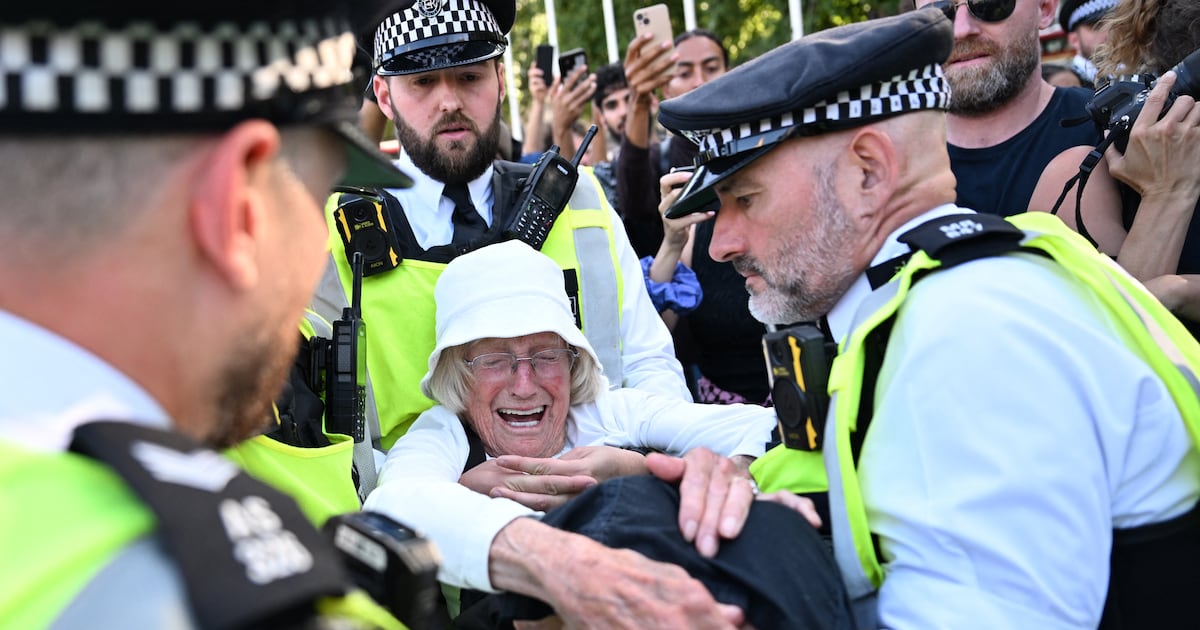Politics
UK Classifies Palestine Action as Terrorist Group, Sparks Outcry

The UK government has classified Palestine Action as a terrorist organisation, prompting widespread criticism both domestically and internationally. This decision has raised serious concerns among artists, writers, and musicians in Ireland, who argue that it undermines the country’s longstanding liberal traditions. Critics contend that the move represents a departure from the UK’s historical commitment to political dissent and freedom of expression.
Palestine Action, founded in 2020, is known for its direct action campaigns against Elbit Systems, Israel’s largest arms manufacturer. Activists have engaged in various forms of protest, including rooftop occupations, graffiti, and even breaking into an RAF base, resulting in damages amounting to millions of pounds. Despite their controversial tactics, the group maintains that it does not advocate for violence against individuals.
The implications of this proscription are significant. Under the new classification, involvement with Palestine Action—including membership, fundraising, or public support—could lead to prison sentences. Historically, such powers have been reserved for paramilitary organisations engaged in armed violence. Extending these measures to a protest group raises questions about the balance between maintaining order and upholding democratic freedoms.
Concerns about double standards have emerged, particularly in relation to Northern Ireland, where public support for proscribed paramilitary groups is often tolerated under the guise of political stability. This inconsistency highlights an erosion of the UK’s reputation as a refuge for political dissidents, a status it once cherished, particularly in cities like London.
The broader context surrounding this decision involves increasing government scrutiny of political expression in response to the rise of extremism online. Authorities have pushed social media platforms to eliminate racist and violent content, leading to the introduction of new hate speech laws. While these measures may be well-intentioned, they prompt legitimate concerns regarding the potential for overreach in policing free expression.
Recent events underscore these worries. The detention of Irish writer Graham Linehan by armed officers at Heathrow Airport, based on comments he made on social media, has drawn accusations of excessive force. Similar debates surfaced in Ireland last year when proposed hate speech regulations faced widespread backlash and were ultimately withdrawn.
The classification of Palestine Action as a terrorist organisation is not merely a dispute over one group’s actions. It serves as a critical test of the UK’s commitment to allowing disruptive protest as a component of democratic life. Critics argue that the government, led by Keir Starmer, has overstepped its bounds and call for the withdrawal of the proscription.
As these discussions unfold, the future of political protest in the UK hangs in the balance. The response to Palestine Action’s classification could shape the landscape of dissent and the rights of individuals to express their views without fear of legal repercussions.
-

 Top Stories3 months ago
Top Stories3 months agoTributes Surge for 9-Year-Old Leon Briody After Cancer Battle
-

 Entertainment4 months ago
Entertainment4 months agoAimee Osbourne Joins Family for Emotional Tribute to Ozzy
-

 Politics4 months ago
Politics4 months agoDanny Healy-Rae Considers Complaint After Altercation with Garda
-

 Top Stories4 months ago
Top Stories4 months agoIreland Enjoys Summer Heat as Hurricane Erin Approaches Atlantic
-

 World5 months ago
World5 months agoHawaii Commemorates 80 Years Since Hiroshima Bombing with Ceremony
-

 Top Stories3 months ago
Top Stories3 months agoNewcastle West Woman Patricia Foley Found Safe After Urgent Search
-

 Top Stories5 months ago
Top Stories5 months agoFianna Fáil TDs Urgently Consider Maire Geoghegan-Quinn for Presidency
-

 World5 months ago
World5 months agoCouple Convicted of Murdering Two-Year-Old Grandson in Wales
-

 World5 months ago
World5 months agoGaza Aid Distribution Tragedy: 20 Killed Amid Ongoing Violence
-

 World5 months ago
World5 months agoAristocrat Constance Marten and Partner Convicted of Infant Murder
-

 Top Stories4 months ago
Top Stories4 months agoClimbing Errigal: A Must-Do Summer Adventure in Donegal
-

 Top Stories4 months ago
Top Stories4 months agoHike Donegal’s Errigal Mountain NOW for Unforgettable Summer Views









